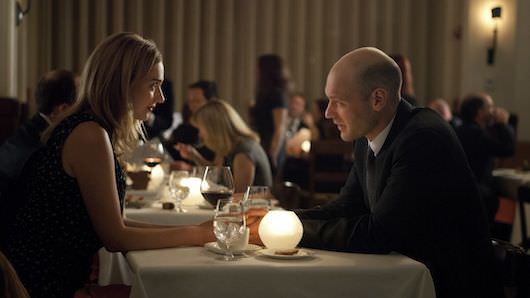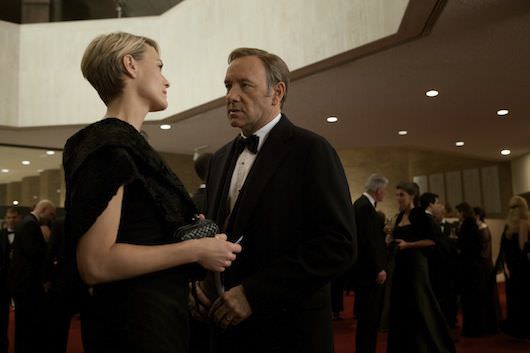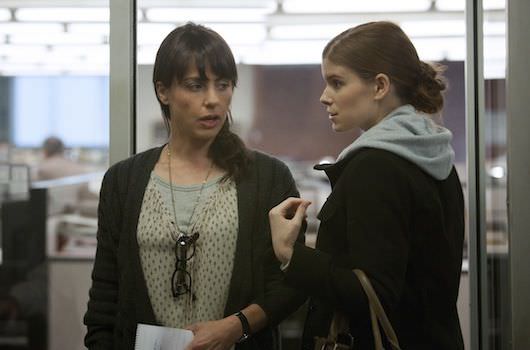Narrative Darwinsim: House of Cards Showrunner Beau Willimon Gets Creative
Since shooting on House of Cards began just one year ago this month, Netflix’s debut series has been the focus of tremendous buzz and speculation—due in large part to its innovative distribution model, stars Kevin Spacey and Robin Wright, and executive producer and sometimes director David Fincher. But from the very beginning, it’s been 35 year-old showrunner Beau Willimon who has been in charge of completely overhauling the 1990 British miniseries of the same name and turning it into one of television’s most compelling and often prescient pieces of programming.
After working on campaigns for Charles Schumer, Hillary Clinton, Bill Bradley and Howard Dean, the St. Louis native and Columbia University graduate returned to school in 2003 to study at Julliard’s American Playwright’s Program, the fruits of which were his Off-Broadway play, Farragut North, and its subsequent film adaptation, The Ides of March, which earned Willimon his first Oscar nomination for Best Adapted Screenplay in 2012.
On July 18, House of Cards received nine Emmy nominations including it’s first for Best Drama. (Spacey and Wright picked up individual nods for acting, as did Fincher for his direction of the pilot.) The Credits caught up with Willimon as he shuttled between New York and the show’s Maryland set to hear how things feel one year in.
![Clockwise, from far left, standing: executive producer Beau Willimon; unit production manager Don Hug; executive producer John Melfi; [seated] director Carl Franklin; and director of photography Eigil Bryld. Photo Credit: Patrick Harbron for Netflix](https://www.motionpictures.org/wp-content/uploads/2013/07/hoc_pds_037_h.jpg) The Credits: I know I’m catching you on the run, so I’ll jump right in with the obvious question: does working on the second season feel crazier than the first?
The Credits: I know I’m catching you on the run, so I’ll jump right in with the obvious question: does working on the second season feel crazier than the first?
BW: No, not crazier, but it’s got its own challenges—the biggest of which is that we’re still writing episodes in the midst of production. Season one, I had seven months prior to filming to get thirteen scripts finished, and we made huge changes along the way as better ideas popped into our brains, sometimes just in response to what we were seeing on camera.
For instance, Peter Russo (played by Corey Stoll) – his character was never intended to run for governor. That was another character altogether, but he was so fantastic on screen with Kevin, we wanted to maximize his screen time. All of us really wanted to see more of him. We looked at the scripts ahead and said “Well, there’s the full storyline where a guy’s running for governor. Why don’t we shift that over to Peter Russo?” It required doing a lot of page one rewrites, but I think the whole story benefitted hugely as a result.
But at the end of the day, we had those thirteen scripts to work off of. It’s different now—we don’t have all the scripts finished. That said, we walk into season two knowing our characters very well, having made decisions about the direction we’re heading, we also know where to streamline our production, so I think it all balances itself out. Ultimately, to finish my too-long answer to your very simple question, the endeavoring to make any TV show is an exercise in insanity. You have to create the equivalent of, in our case, seven movies in the course of less than a year and that’s a madness. It’s a wonderful madness.

And this all started four years ago with that first call from David Fincher? Was that something you ever anticipated?
No, not at all. I mean, certainly people were bringing me ideas and asking about projects that had to do with politics, and most of the time I was saying no, because I wasn’t interested in doing another political story right away after Ides of March. That had been an eight-year journey for me, and I felt like I had scratched that itch. But, I had heard about the BBC version of House of Cards and David Fincher is one of the most extraordinary directors alive. So I said at the very least I’ll watch it and have a conversation. I saw the BBC version, loved it, had a bazillion ideas about how to make it feel contemporary, American, and most importantly our own. I got on the phone with Fincher and said, “Look, I don’t want to do an adaptation, I want to do a completely new reinvention. I want to use this as a launch pad for our own story and steal a lot of great stuff, but not feel beholden.” We got to talking and shared all the same instincts and intentions.
Where did things go from there?
The first year was spent working on the first episode. I worked on that script for almost a year. During that process we got Kevin [Spacey] and Robin [Wright] on board, so we had our two stars and we had a script that we were all pleased with. Then, it was time to find our home. We met with a number of usual suspects in the cable world and also we had learned that Netflix was interested in original programming. We didn’t know exactly what they planned to do, or how they planned to do it, but we thought it was worth sitting down with them—and when we did, they promised us two seasons upfront and creative freedom. So, at that point, it was an offer we really couldn’t refuse. I mean, those offers don’t happen. Even when you have two big stars and a legendary director on board, you don’t get that sort of commitment. So once we teamed up with Netflix, it was like boom, let’s start talking about when this will air and when we start shooting.
It just so happened that Kevin was doing a nine-month world tour with Richard III, so we knew we weren’t going to be able to shoot for at least nine months. I said, let’s take that time to write this sucker. So over a few weeks, I hired a staff, we got to work and we had seven months of working in the room before the cameras started to roll. It takes a few months to shoot, a few months of post-production, you have your release date and before you know it, two years have passed.
Does the Netflix model of releasing an entire season at once affect the way you write?
No. It doesn’t, and I’ll tell you why. Even if you release all thirteen in one day, it doesn’t guarantee that people are going to binge. It’s cool to have the option, but there are plenty of people who watch over a period of thirteen weeks or longer, so the story has to work in all sorts of ways. It has to be something you hope is worthy of a binge but maintain enough suspense to keep people interested.
The thing about working with Netflix that really affected the writing the most was knowing that we had two seasons. The fact that we knew we had 26 hours meant that I could think about where we would end up at the end of season two and I could introduce things early on in season one that might not fully pay off or resurface until towards the end of season two, and that’s a great luxury. A lot of shows, especially on networks—you don’t even know if you have your back nine, so you end up cramming so much story in early on, or the opposite, you have network executives saying you can’t move too fast because you have to do a slow drift. We knew we had this sort of novelistic canvas and that allowed us to tell a better story in the long run.

Whose idea was the two-season guarantee?
We told everyone we wanted a full season guaranteed and we weren’t interested in auditioning with the pilot. We’re a group of people who throw 150% into everything we do and we care deeply about what we put our name on. What Netflix said was, “We’ll not only give you that, we’ll double up.” And of course, creative freedom was a huge thing, too. They said, “We are not going to get in your way, we believe in you as storytellers, we want you to make the show you want to make.” We’ve been in constant communication with Netflix all throughout the process. They’ve read scripts, they look at dailies, they come to table reads, but I’ve never once received a document from Netflix with notes. After table reads, I might say to [Netflix content VP] Cindy Holland, “Hey what’d you think? Do you want to get some coffee?” and we’ll sit down for half and hour and talk. But it’s a conversation and it’s never a corporate dictate.
Does your writers’ room look different than the average writing room on a television drama?
I like to surround myself with a diverse group of minds, so my goal is not to populate the writer’s room with a bunch of political junkies. In many ways it was the opposite. The show is not catered to people who are political junkies. If you have smart people with original voices in a room, you can always do the research. We talk to experts, we do our reading, we do our field trips and we have our consultants—we do all that due diligence, but really what I’m after is unique, emotional moments. In order to achieve that, it’s great to have a lot of writers who have extremely different voices who can see a scene or a conflict from many different angles. It fosters narrative Darwinism—the best idea wins.

The casting on the show is equally eclectic in terms of the experience your actors have and the backgrounds they come from.
I’ve heard this quote before but Fincher repeated it recently: “Our cast is living proof of the old adage, ‘Cast well and get the hell out of the way.’” We are in the rare situation where we got all of our first choices. Everyone we wanted not only happened to miraculously be available, they also connected with the material, and certainly Fincher had a huge part to play in that. The reason we have Kevin Spacey and Robin Wright is because he has long-standing relationships with both. We were embarking on a big risk. Not only were we asking them to do television, but asking them to do it on a platform that had never been tried before. Netflix had never done television, David had never done television, I had never done television, none of us had, so none of us really knew what we were doing. We were asking them to jump off the cliff with us and see if we could fly.
I’m not precious about words. Any great script, when you film it, should be able to work on mute. Which means, when you turn the sound off, you can follow what’s happening and still care. Because it’s not actually about what people say, its what they do. And the words are signposts to the emotional circumstances of a scene. It’s giving the actors the ammunition to go out and do what they do best, which is provide the magic between the lines, and that’s what people want to see. The whole reason we have a director and a cinematographer and a writer and a gaffer and catering and an accounting department and a production team—all that exists so that the audience can watch actors behave. We all serve that master. When you have a great cast, they can certainly make the rest of you look good.
Which would blow the mind of an 18 year-old you more: that you spent your 20s working on major political campaigns, or that in your 30s, you’re writing a hugely successful TV show?
When I was 18, I feel like I still wanted to be a physicist. I had no idea where my life was heading. Actually, I probably thought I was going to be a painter more than anything. I hadn’t started writing when I was 18, nor, while I cared about politics, was I particularly active. I’ve always been a little bifurcated. My majors in college were visual arts and American history. I guess those two paths spoke to the two different sides of me. I probably could’ve seen myself working on political campaigns, but I would’ve been thrilled at the idea that I was pursuing a life in the arts, although I think I would’ve been astounded at the idea that I was doing it as a writer. It would’ve been trippy. It would’ve been like taking copious amounts of drugs, which is what I was doing at 18.
Featured photo: Director David Fincher with Kevin Spacey on the set of Netflix's House of Cards." Photo credit: Melinda Sue Gordon for Netflix


